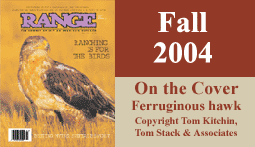

 |
 |
|
She swings a 40-pound saddle over her quarter horse mix, hops aboard and pokes towards the center of town to snag the mail. “Ain’t nothing,” says this Kaycee, Wyo., horse woman who’s loped steeds 10 times her size since, at age two, her folks first roped her to a saddle she couldn’t slide off. “Broke my first mustang at nine. Heck, I’d still be punching cattle if I could still read the brands.” Georgie Connell was a five-year-old birthday girl at Trout Creek near Seligman, Ariz., when Dad slapped down $75 for her first horse, Buster, who loved biscuits. Georgie, in pig-tails, wearing Levis held up with rope, tossed a biscuit on the ground, scooted up Buster’s neck, and took off. “Just watch out for rattlers,” hollered mom, “and be back before sundown.” Georgie took three mile short-cuts to school through deep streams and thick cottonwood stands. Mustangs tried to outrun Buster to school, “but never could,” and ended with Georgie sharing a sandwich bag full of crumbs, and a big smile. While the one-room school seemed to teach only “inside work” to girls, her teacher’s words, “never say can’t,” became an inspiration. Whether she was brush-dragged from the saddle, tumbled in a gopher field, or knocked flat in the dirt with a broken arm (after Buster bucked because of a bee sting), the treatment was always, “aw shucks,” and pails of ice water. “Just wasn’t enough cash for Docs back then,” says Georgie, who talks about having enough horse sense, to keep fingers out of a lariat so “you don’t lose your thumb like Pa.” Each spring there was a 25-mile back-pack into Arizona’s Penitentiary Mountains “to visit Dad.” There, Georgie, sisters Ida, 13, Emma,9, and brother Clyde, 7, escaped 120-degree heat, broken water coolers, wood stoves and weekly tub baths. Swimming holes abounded, as did sweet pear fruit, cactus candy, and squaw-berries to stuff into saddle-bags for lemonade. At night, Georgie sat around the campfires and listened to cowboy stories for hours, “because they were clean and good.” By age 17, Dad considered Georgie “old enough” to run the ranch alone. Her parents had divorced, remarried and moved away. Emma lived with Mom. Ida married. Clyde got a ranch job, but Georgie could not get hired because she was a girl. Georgie shoed, roped, tied cows, packed salt and banged nails until things got lonesome enough to saddle a bedroll and hit the trail for somebody to talk to. “Cause now and then,” says Georgie, “you needed that.” They were cowboys, mostly, the kind of people who could be trusted when she had high fever and chest pains, miles from nowhere. Two fellows soaked Georgie’s feet in hot water and mustard, wrapped her in warm blankets and stoked coals until her fever broke. “Saved my life,” says Georgie. Finally, it was a bronco-buster she met at age 23, she trusted most. Frank Sicking was a real man, according to Georgie, and a real cowboy who wrangled breakfast, scrubbed floors and wrestled the kids when Georgie was out riding herd. Frank was the kind of guy who doffed his hat, kicked spurs and mud from his boots before stepping inside, and “was always there when the chips were down.” “Truth is,” says Georgie, “Frank and I were partners.” Today Georgie rides her pal “Monty” along the Powder River, into town, where she hitches to the café rail and ropes a few more good, clean stories from “the kinda folks who’d never let you down.” And for this cowpoke, that’s everything. Georgie was the first Nevada woman inducted into the Cowgirl Hall of Fame for “preserving Western Heritage through poetry”; honored by Nevada Cattlemen for over 100,000 miles on horseback; and recipient of the “Gail Gardner Award” for “outstanding working-cowboy poet.” Author of three books of poetry, Georgie often recites at the National Cowboy Poetry Gathering in Elko, Nev., an event she shares with one message: “Keep it cowboy and keep it clean.”
Today,
Georgie lives in
Kaycee, Wyo., with
her two horses and
claims the secret
to a good life, is
a “good dog, a
good horse, and a
wide open
range.”—by
Gary Watkins
.
|
|
|
|
|
|
© 1998-2005 RANGE magazine. All rights reserved. | For reprints, permissions or general questions, contact |
|
Brought to you by Dolphin Enterprises |